|
|
|
Sort Order |
|
|
|
Items / Page
|
|
|
|
|
|
|
| Srl | Item |
| 1 |
ID:
147819


|
|
|
|
|
| Summary/Abstract |
Ideological affiliations like Africanism, charterism, and Black Consciousness shaped the political boundaries of student and youth political groups in South Africa during the tumultuous 1980s, and continue to inform contemporary youth politics. These delineations have also been used in the secondary literature to understand organizational competition and when considering how young activists negotiated contested political ground. However, this article suggests that the boundaries between opposing organizations were often blurred by their overlapping use of competing ideologies. It further argues that these divisions, although articulated ideologically, were rooted in organizational affiliation and competition for political influence and territory. It analyses the ideological development of the Congress of South African Students, the Azanian Students’ Organization, and the South African Youth Congress, and tracks the changing scope for ideological expression within charterist student and youth formations. It suggests that during the 1980s the scope for differing ideological expression narrowed, and links this process to the ANC's efforts to establish hegemony within the charterist movement. The article argues that this history is important in order to understand the ideological ‘unruliness’ or flexibility of the ANC Youth League after apartheid and the rise of Julius Malema's Economic Freedom Fighters, and considers how ideological difference within youth politics is beginning to be expressed outside the fold of charterism.
|
|
|
|
|
|
|
|
|
|
|
|
|
|
|
|
| 2 |
ID:
147818
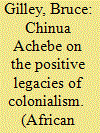

|
|
|
|
|
| Summary/Abstract |
The late Nigerian writer Chinua Achebe was a key figure in the rise and persistence of anti-colonial ideology in Africa. Yet in his final work, Achebe made a clear statement about the positive legacies of colonialism, praising the British project of state formation and nation building in the lower Niger basin. A careful study of his writings and comments from 1958 until his death in 2013 shows that Achebe was never the simple anti-colonial figure that most assumed, and that his seeming reversal could be read as the culmination of a lifetime's meditation on African history and politics. Achebe's final views have significant paradigmatic implications for the knowledge relevant to national identity formation and state building in Africa today.
|
|
|
|
|
|
|
|
|
|
|
|
|
|
|
|
| 3 |
ID:
147821
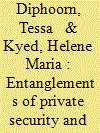

|
|
|
|
|
| Summary/Abstract |
Security in Africa is seldom a public good provided by the state, but is frequently something you pay for or acquire by turning to various non-state or community actors. The privatization of security in African cities is reflected in the rapid growth of the private security industry, which is matched by the widespread involvement of civilian actors in neighbourhood watches and self-organized policing groups. Much of the scholarly debate on ‘plural policing’ and ‘security assemblages’ has focused on what the privatization of security means for the state, highlighting how the public–private divide is increasingly blurred as state police services interact with either private or community security actors. This article adds a novel perspective by exploring the entanglements between private security companies and civilian community policing groups in urban areas of South Africa and Swaziland. Based on ethnographic fieldwork, the article shows how these actors engage with each other in different, often informal, ways and across socio-spatial boundaries. The result is the simultaneous communalization of private security and privatization of community policing. However, these are not straightforward processes. Sets of actors slip in and out of commercial and community logics of security, but also frequently articulate their distinctions as part of positioning themselves in a competitive security landscape, thereby raising questions about the objectives and motivations that drive many security performances.
|
|
|
|
|
|
|
|
|
|
|
|
|
|
|
|
| 4 |
ID:
147822
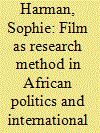

|
|
|
|
|
| Summary/Abstract |
This research note reflects on the use of film as a method in researching politics and international relations in African countries. It is based on the experiences of producing a feature-length drama about the everyday risk of HIV/AIDS, using real people and their stories in Tanzania. The intent of the film, Pili, is to challenge international aesthetics of HIV/AIDS in film and how people understand the complexities and structural politics of disease. It is argued that the film itself is not the only outcome or contribution to knowledge. The external narrative or process of how the film was made, the method of doing, also produces new ways of thinking about ethics, collaboration, and navigating the state in conducting research. The research note makes this argument by first reflecting on the origins and debates of visual method, and then exploring what film as a research method reveals about structure and agency, research collaboration, ethics, and the state.
|
|
|
|
|
|
|
|
|
|
|
|
|
|
|
|
| 5 |
ID:
147817
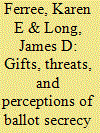

|
|
|
|
|
| Summary/Abstract |
Are contingent electoral strategies, like vote buying and intimidation, effective in Africa? No, according to recent scholarship: unlike parties in other developing regions like Latin America, African parties lack the capacity to violate ballot secrecy and force voters to stick to their end of the bargain. Voters can therefore “defect” and vote their conscience. We challenge this perspective. Recent Afrobarometer data show that nearly one in four Africans doubt ballot secrecy. We argue that the perception of ballot secrecy violation is sufficient for enabling contingent strategies. Drawing upon Afrobarometer data and an original exit poll conducted during the 2008 Ghanaian election, we show that doubts about ballot secrecy correlate with vote buying, intimidation efforts, and measures of campaign intensity, suggesting that they are a deliberate product of party efforts. Pervasive doubts about ballot secrecy challenge the notion that African parties are too weak to implement contingent electoral strategies. African parties can and do convince voters that their vote choices are known, particularly in urban areas where party capacity and community accessibility are highest. Doubts about ballot secrecy enable both vote buying and voter intimidation strategies, and suggest that formal rules enshrining the secret ballot offer insufficient protection to African voters.
|
|
|
|
|
|
|
|
|
|
|
|
|
|
|
|
| 6 |
ID:
147816
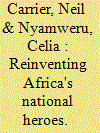

|
|
|
|
|
| Summary/Abstract |
A nation's heroes are rarely fixed and are frequently reassessed and reinterpreted by new generations. In the case of a number of African countries, the very masculine liberation heroes of yesteryear often prove divisive, emerging from very fraught histories. In this context, there are moves to broaden the pantheon of heroes and make history more inclusive. In Kenya, where the contested history of Mau Mau provides several heroes, Mekatilili wa Menza, a female figure from the coast who played a significant role in Giriama resistance against the British in 1913, has emerged as a national heroine. The article introduces this historical figure using published sources, and then traces the historical arc of her memorialization and evocation from post-Independence praise as a feminist icon to her recent elevation to the Kenyan pantheon of national heroes and heroines. In doing so, it illustrates the ways in which her story is being retold on the coast by Giriama organizations that have made her a central figure in local heritage movements. Finally, in the changed context of devolved Kenya since the 2010 constitution came into force after the 2013 election, this article shows how her story gained further salience as coastal politicians claimed her memory for regional goals. It argues that while figures such as Mekatilili may appear less divisive than Mau Mau, how their history is told and used is equally political.
|
|
|
|
|
|
|
|
|
|
|
|
|
|
|
|
| 7 |
ID:
147820
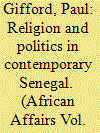

|
|
|
|
|
| Summary/Abstract |
Senegal has a clientelist political system, which is personalized, opaque, and characterized by wide impunity for the political elite. The most salient social force in the country is the Sufi brotherhoods, especially the most important religious families within them, which have been an integral part of the clientelist system since the time of Diouf (1981–2000). Although the essence of a brotherhood is the disciples’ submission to the will of the guide, it was never the case that a guide could simply deliver his disciples’ votes to his chosen politician. Disciples could distinguish political from religious injunctions, and a combination of economic and political factors also influenced decisions. Nevertheless, the Mouride brotherhood in particular benefited under Abdoulaye Wade (2000–12), who publicly identified himself as a disciple – and, in turn, Mourides tended to give him their support. Macky Sall (2012–present) in his presidential election campaign appeared more negative towards all religious forces, a neglect seemingly evident in certain problems that have arisen since his election. Yet, though the brotherhoods still exercise considerable power, this article argues that their influence is waning. External factors from the wider Islamic world explain this decline in influence, as well as internal factors such as the commercialization of the religious families and the growing reluctance of increasingly educated disciples to be dictated to in political matters.
|
|
|
|
|
|
|
|
|
|
|
|
|
|
|
|
|
|
|
|
|